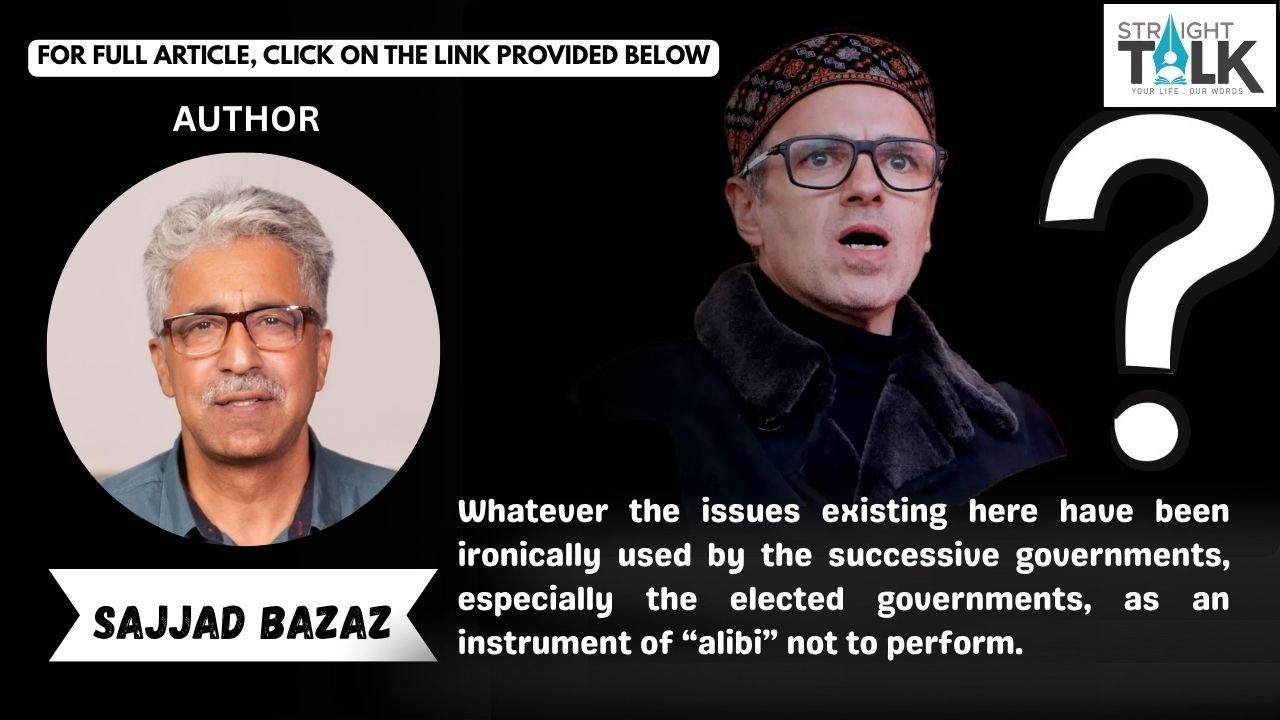Governance Is Responsibility, Not Opportunity

Whatever the issues existing here have been ironically used by the successive governments, especially the elected governments, as an instrument of “alibi” not to perform.
Sajjad Bazaz
The Omar Abdullah-led Jammu and Kashmir government is caught in a tight spot. Its own senior most leaders and Members of Parliament (MPs) Mian Altaf and Aga Ruhullah have publicly snubbed Chief Minister (CM) Omar Abdullah for delivering the governance which is loaded only with question marks, as it does not match the poll promises made to the voters a year ago in the Assembly elections. Even its alliance partner, the Congress, has joined the anti-Omar campaign intensified by the National Conference MPs, asking CM Omar to behave or face the consequences.
The pace at which the anti-Omar campaign is picking up within the faction of the frontline cadres of the National Conference, reflects that down the line a good section of the party workers and other leaders may be in a mutiny mood. Who knows, they must be waiting for an appropriate time to vent their anger against their own leadership and join the rebel faction, which seems already in place within the party but not visible to the naked eye so far.
Perhaps, Omar Abdullah has picked the writing on the wall with an intensified campaign against him within the party for ‘failing’ to provide good governance. In an interview with NDTV he hinted to ‘resign’ if statehood is not restored to Jammu and Kashmir. And perhaps he is indirectly conveying to the warring faction in his party that he has the option to disband the government if he feels his chief ministership is at stake. Notably, when reporters at a press conference asked him about his resignation threat, he didn’t reiterate it. But he was blunt to admit ‘hope of getting statehood back is fading away’.
Anyways, these are the assumptions in the given political situation confronting the National Conference where unity within its constituents is shaking like a jelly. However, the situation brings the culture of governance in Jammu and Kashmir again into focus with question marks.
Let us have a relook at the culture of governance in J&K. Basically, here governance has always remained a formidable challenge. When we peep into the past, we find that the culture of governance we have observed never seriously prioritized resolution of the issues confronting this region. In fact, we witnessed the culture of governance driving the issues. And whatever the issues existing here have been ironically used by the successive governments, especially the elected governments, as an instrument of “alibi” not to perform.
Let me make a frank assertion that comparatively governors’ rule in whatever circumstances has at least delivered when it comes to basics of governance. I fervently believe that a comparative analysis of the governance in J&K between the elected governments and the governors’ rule will vet this statement.
What is the perfect culture of governance? To find an answer to this question, let me reproduce a statement of Dr. C. Rangarajan – a prominent Indian economist, former Member of Parliament, and the 19th Governor of the Reserve Bank of India. Some time back speaking at one of the annual conferences of the Indian Economic Association, he listed six challenges to sustain a high rate of growth and accelerate it to higher levels and translate that growth to broad-based poverty reduction. Setting up agricultural growth, infrastructural development, fiscal consolidation, building social infrastructure and managing globalization were the first five challenges identified by him. He stated that these challenges could be met only with the sixth challenge, which is good governance.
So, what matters is good governance. We know it implies the process by which the ruled are guaranteed the right to good life which inter alia include good housing, sufficient food, quality education, justice and fair play, security of life, liberty and property.
The concept of governance has over the years gained momentum and a wider meaning. Apart from being an instrument of public affairs management, or a gauge of political development, governance has become a useful mechanism to enhance the legitimacy of the public realm. At the same time, it has also become an analytical framework or approach to comparative politics. And it is the combination of political, bureaucratic and corporate governance which together can lead to good governance.
At our place let us own it that the gradual decline in the heritage of trust in the institutions of governance has been there for decades. We find borrowed ideas being implemented without assessing the suitability, acceptability and adaptability to the local environment. However, it is to be understood that bad governance does not owe its origin to a conflicting situation. The political, bureaucratic and corporate governance should not remain hostage to the issues confronting the region.
It is also a fact that the concept of governance has over the years gained momentum and a wider meaning. Does it simply mean providing essential needs of the day or it means something more? Does it matter if corruption, poor accountability, lack of transparency and the rule of law suffer while people are given roads, water and electricity? These are among a few thought-provoking questions. However, the model of governance differs from place to place and what is most needed is to get the focus right. It is all about the goals to be achieved and the approach being followed.
Meanwhile, issues like reconstruction and maintenance of existing physical assets, investment in physical infrastructure, investment in social infrastructure, conducive climate for private investment, balanced regional development and comprehensive fiscal adjustment should be the subject of concern. These broad based developmental areas should not be confined to debates only, but translated into workable programmes.
Finally, the point is that the political dispensation in power should take governance as responsibility, not as an opportunity. Ours is a region flooded with a wide range of economic issues. Youth unemployment is growing at an alarming pace. While we witness a burgeoning number of unemployed youth, at the same time thousands of people coming as skilled and unskilled workforce from outside the state find work here. The situation is simply a paradox. So, there is dire need to address the unemployment issue and for this basic thing is to change the skill profile of J&K youth to match the market needs so that they become employable.
Precisely, the Omar-led government has the responsibility to turn things around. Even as the first year report card of the government is not healthy, time is still on its side. Being in the seat of power, the elected government needs a big heart to take governance as responsibility and not let down their people any more.
(Sajjad Bazaz is Editor-In-Chief at Straight Talk Communications.)







